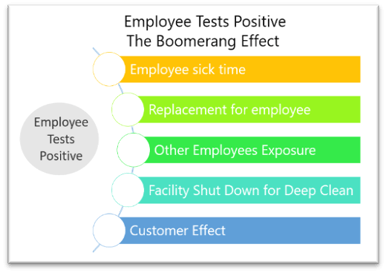
New regulations are forcing all organizations to rethink their sanitation and hygiene procedures and to become more focused as they consider potential hazards at their facilities. To operate in these unprecedented times, focus is turning to a more strategic way to operate at peak efficiency and accountability with enhanced operational procedures across the organization.
Now more than ever, safety is at the forefront of everyone's thinking.
Employees and facilities represent your brand's reputation. Not having a safe and effective operational management process can negatively impact your business. Facilities that are not cleaned and sanitized and employees that do not adhere to strict personal hygiene may contribute to the current COVID-19 outbreak.
This means that as the country gets back to work, employers must instill practices and procedures that ensure basic preventive measures and safety precautions to reduce the risk of employees contracting COVID-19 or spreading it in the workplace. Having just one employee test positive for the virus can have a boomerang effect on the community, the business and the brand.
 To protect its returning workforce, standards on social distancing and health and safety protocols must be implemented. If not, the costs to a business could be drastic and possibly devastating.
To protect its returning workforce, standards on social distancing and health and safety protocols must be implemented. If not, the costs to a business could be drastic and possibly devastating.
If you have an employee test positive to virus you could be responsible for paying the employees sick leave. Under H.R.6201 of the Family First Coronavirus Family Act, a private employer with fewer than 500 employees must provide covered employees emergency paid sick and/or paid family leave. The law, which takes effect no later than April 2, 2020, will remain in effect until December 31, 2020.
Employers within the above parameters must provide full-time employees 80 paid sick leave hours and a proportionate amount to part-time employees.
While the employee is out on sick time, your business may incur the costs of replacing that employee and having to back-fill their position. This is an additional labor expense that could impact your business.
The following table highlights potential sick leave and replacement costs associated to an employee testing positive.

In addition, organizations must consider the possibility that other employees may have been exposed to the virus. According to the CDC, all employees who work closely with an infected employee should not be at work for a 14-day period of time to ensure the infection does not spread. These employees should be placed on paid sick-leave, either under company policy or using the new emergency sick leave package offered by the Families First Coronavirus Response Act.
The following table outlines potential labor costs associated to an employee testing positive.

The potential costs do not stop at Labor. It is possible that a business may incur a shutdown if an employee becomes ill. If within a seven day period it most likely that the facility will require deep cleaning and sanitizing. This could possibly close a business for at least 2 days (24 hour period).
The steps to be followed are:
The impact is dependent upon the business operating costs. An example below outlines the potential costs for a casual dining 30 table restaurant.
Example: Restaurant Assumptions for loss revenue of 2 days of Revenue:
| Average Ticket | $25 |
| Number of Tables | 30 |
| Number of carry-outs | 50 |
| Daily Covers (Lunch & Dinner) | 2 |
| Potential Revenue Lost per Day | $75,000 |
| x2 Days | $125,000 |
Once customers become aware of a coronavirus situation within your business, you may experience a decline in sales. With social media, news has a way of traveling quickly. On Twitter alone there are over 145 million daily active users. Approximately six of every 10 Twitter users worldwide are between 35 and 65 years old. This can lead to customers staying away from your business and looking to alternatives.
Based on all these significant events that could possibly lead a business to financial ruins, a business must react swiftly to adopt operational procedures that are enforceable. A mobile digital task management solution provides employers the ability to establish and enforce operational processes. The system provides the means to ensure sanitation and hygiene practices are being completed and on schedule to protect the employee and customers.
A digital task management solution (like Procurant offers) provides complete recordkeeping and storage of these sets procedures so that employers can verify and prove that processes are being carried out for the safety of all.
Procurant SafeGuard™ is Procurant's latest offering to provide a ready-made solution for businesses in these challenging COVID-19 time. The solution provides:
A digital checklist can provide peace of mind knowing your safety measures are met and maintained to the benefit of your customers, business, employees, and ultimately brand.
Lorem ipsum dolor sit amet, consectetur adipiscing elit

These Stories on Food Safety
Procurant USA LLC
475 Alberto Way - Suite 230
Los Gatos, CA 95032
1-669-221-1026
info@procurant.com
